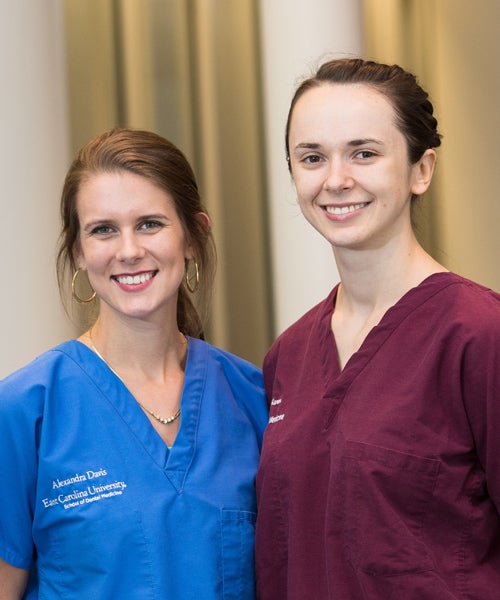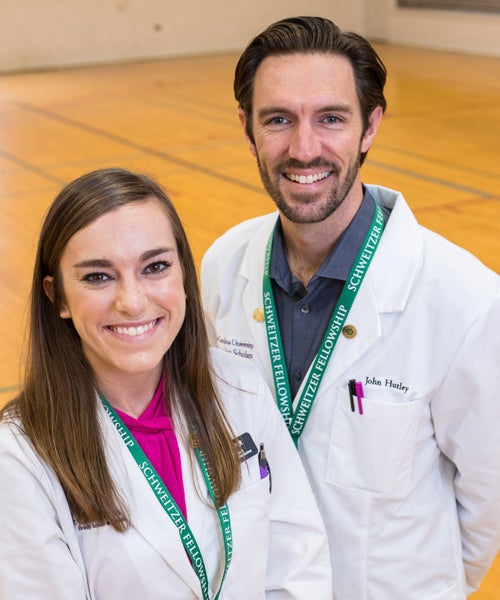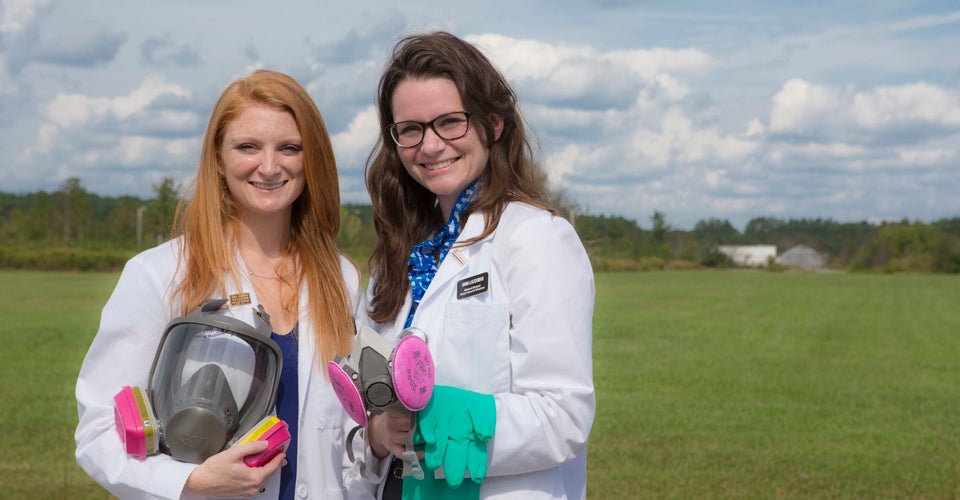HANDS-ON HEALTH
Schweitzer Fellows address community's health needs
Six East Carolina University graduate students — four from the Brody School of Medicine and two from the School of Dental Medicine — are developing projects aimed at positively impacting community health as part of the Albert Schweitzer Fellowship program.
They are among 30 Schweitzer Fellows from North Carolina and 240 nationwide who will spend the next year learning to address the social factors that impact health while developing lifelong leadership skills.
“Our program is making a lasting impact on the health of communities in North Carolina as our Fellows first learn to serve and support vulnerable people in living healthier lives, and then take those skills with them when they establish themselves professionally as leaders in their field,” said Barbara Heffner, director of the North Carolina chapter of the Albert Schweitzer Fellowship.
Safer Farms, Safer Families
Brody students Emily Cunningham and Anna Laughman both grew up in farming communities, Cunningham in Walstonburg and Laughman in Ayden. They could see firsthand that there were unmet needs in the migrant farm worker community.
“I knew I wanted to work with migrant farm workers, and she knew she wanted to focus on pesticides,” said Cunningham. “So we teamed up and put the two together.”
Their project centers on improving awareness about the dangers of pesticide exposure, and ensuring that regulations are followed.
“From what we’ve seen, a lot of farm workers would just go out into the fields and work as they were; they weren’t wearing the gloves, the respirators or the proper clothing,” Cunningham said. “That’s actually incredibly dangerous not only for them, but also for their families. We want to diminish the exposure that farm workers (cause) their families by bringing home the pesticides on their clothes and shoes.”
They are addressing the issue on two fronts — educating health care providers about new EPA guidelines for who is allowed to work with pesticides, and visiting farm worker communities to provide education and safety tips for pesticide use.
“One of the things we educate about is proper glove usage, and how it should be all nitrile gloves,” said Laughman. “A lot of the farm workers have the typical gardening gloves with cotton on one side, but that just absorbs the pesticides.”
In partnership with the N.C. Agromedicine Institute, the pair has been able to provide workers with free, re-usable gloves.
The Schweitzer Fellowship program emphasizes the development of sustainable, long-term projects, so Laughman and Cunningham are creating Area Health Education Center (AHEC) courses so that the health care education aspect of their work can continue after their one-year project is finished.
“We’re hoping that by creating these AHEC modules and educating the health care providers, that we’re going to give them the resources necessary to evaluate the OSHA questionnaire and provide more adequate health care to the migrant farm workers,” Cunningham said.
Prenatal Oral Health Program
Dispelling myths can be an uphill battle, but dental students Alexandra Davis and Ljiljana Karan plan to give it their best.
“There are so many myths surrounding oral health care during pregnancy,” said Davis. “So many people, including health care providers, believe that pregnant women should not receive dental treatment or be exposed to any radiographic imaging during pregnancy, but the scientific literature says otherwise.”
Davis and Karan want to reach as many providers and patients as possible with the message that pregnancy doesn’t hurt teeth or make them fall out, and that dental care during pregnancy is safe and can help moms have healthier babies.

2016-2017 Blue Cross Blue Shield of North Carolina Foundation Schweitzer Fellows, Alexandra Davis (at left) and Ljiljana Karan will expand on the prenatal oral health program established by Schweitzer Fellows last year. (Photo by Cliff Hollis)
To accomplish this, the Fellows will build upon the Prenatal Oral Health Program (pOHP) brought to ECU from the UNC-Chapel Hill School of Dentistry last year by ECU dental students and Schweitzer Fellows Mary Bec Keith and Kaitlyn Anderson Spencer and their faculty mentor, Dr. Linda May.
The multimedia materials provided by pOHP contain research-based information on oral diseases, medications that are safe during pregnancy, nutrition, oral hygiene and infant oral health. Keith and Spencer presented awareness training on the importance of prenatal oral health care for Brody School of Medicine students and obstetrics/gynecology residents.
Now, Davis and Karan will expand the project to invite additional agencies, such as the Pitt County Health Department, to refer pregnant patients to the dental school. As part of the vision for sustaining the project, they will also work to increase the number of pregnant patients at the school’s eight community service learning centers across the state.
“We’re planning ‘lunch and learn’ presentations for dental and medical students, residents and faculty that will include the data and significance and address unfounded myths,” said Karan, “and we’re making it easy for dental, OB/GYN and health department providers to access pOHP visual aids for patients during appointments.”
Davis and Karan are drawn to public health, especially women’s health, because of their life experiences. Karan escaped war-torn Bosnia and Herzegovina with her family as a child and moved to North Carolina.
“As refugees to this country, my family and I had very little access to health care and were often on the receiving end of public health service. Thus, I have felt firsthand the uplifting impact that service can have on an individual, inspiring in me a desire to instill in others the education and empowerment that my family and I had felt,” she said.
Davis was inspired to pursue a career in health care by her mother, an ECU-trained obstetrics nurse dedicated to improving the health of women in eastern North Carolina.
“The ultimate hope is that pregnant women will realize how their oral health impacts both their systemic health and the health of their newborns,” said Davis.
On Belay
John Hurley and Leslie Hopper’s project was also inspired by their experiences. Hurley served in the U.S. Army as a medic for 16 years, while Hopper spent two years working at a veterans’ hospital. Both are now Brody students with a personal interest in improving the lives of veterans.
When Hurley left the service for a desk job in 2011, he said, he did not adjust to civilian life in a healthy way, and he did not easily find the support he needed during that time. He and a friend supported each other, and both agreed there was a need for a program that would help connect veterans to the resources they need.

Leslie Hopper and John Hurley’s project is designed to provide assistance for veterans transitioning to civilian life.
He describes On Belay as a peer support system. Veterans are connected with sponsors in the community who are there to help them access veterans resources, or simply provide a listening ear.
“What we’re trying to do is get them out of isolation and pair them up with an informed sponsor that they can just talk to,” Hopper said. “It’s not someone who’s trying to diagnose them, it’s not someone who’s trying to counsel them. They’re there to listen and to bounce ideas off of, and just make it so they don’t feel alone.”
There is often a gap between veterans and the professional care they need, she added, because they don’t want to reach out for help.
More than a dozen sponsors have undergone training, and veterans have begun to sign up as well. The goal for the yearlong project is to have 40 of each, but Hurley’s own goal is much bigger.
“If possible I would love for this to go nationwide because we have veterans everywhere who are coming out of a negative situation, or a positive situation, in the military and are having a hard time adjusting,” he said. “I’m very excited about the program and the void that it’s filling.”
Hopper said that while working with veterans, she noticed that many did not respond to verbal thanks for their service. “Their response was, ‘Do something to show your appreciation; don’t just say something.’ This, to me, came as a perfect opportunity to be able to do something.”
For more information about On Belay, email onbelay2016@gmail.com.
“The Schweitzer Fellowship provides a springboard,” Hurley said. “No matter what you’re doing, you need assistance and mentorship, and that’s what this program provides.”
Peggy Novotny of University Communication contributed to this story.
(Video by Rich Klindworth)
